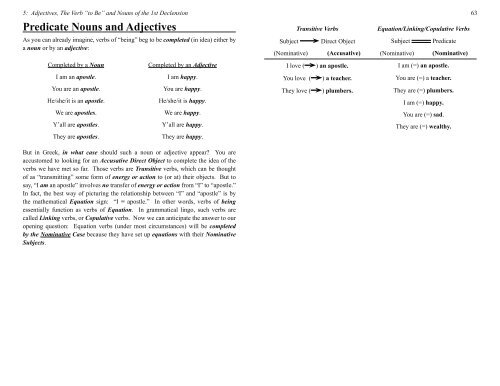Elementary New Testament Greek, 2014a
Elementary New Testament Greek, 2014a
Elementary New Testament Greek, 2014a
You also want an ePaper? Increase the reach of your titles
YUMPU automatically turns print PDFs into web optimized ePapers that Google loves.
5: Adjectives, The Verb “to Be” and Nouns of the 1st Declension<br />
Predicate Nouns and Adjectives<br />
As you can already imagine, verbs of “being” beg to be completed (in idea) either by<br />
a noun or by an adjective:<br />
63<br />
Transitive Verbs<br />
EquationLinkingCopulative Verbs<br />
Subject Direct Object Subject Predicate<br />
(Nominative) (Accusative) (Nominative) (Nominative)<br />
Completed by a Noun<br />
I am an apostle.<br />
You are an apostle.<br />
He/she/it is an apostle.<br />
We are apostles.<br />
Y’all are apostles.<br />
They are apostles.<br />
Completed by an Adjective<br />
I am happy.<br />
You are happy.<br />
He/she/it is happy.<br />
We are happy.<br />
Y’all are happy.<br />
They are happy.<br />
I love ( ) an apostle. I am (=) an apostle.<br />
You love ( ) a teacher. You are (=) a teacher.<br />
They love ( ) plumbers. They are (=) plumbers.<br />
I am (=) happy.<br />
You are (=) sad.<br />
They are (=) wealthy.<br />
But in <strong>Greek</strong>, in what case should such a noun or adjective appear? You are<br />
accustomed to looking for an Accusative Direct Object to complete the idea of the<br />
verbs we have met so far. Those verbs are Transitive verbs, which can be thought<br />
of as “transmitting” some form of energy or action to (or at) their objects. But to<br />
say, “I am an apostle” involves no transfer of energy or action from “I” to “apostle.”<br />
In fact, the best way of picturing the relationship between “I” and “apostle” is by<br />
the mathematical Equation sign: “I = apostle.” In other words, verbs of being<br />
essentially function as verbs of Equation. In grammatical lingo, such verbs are<br />
called Linking verbs, or Copulative verbs. Now we can anticipate the answer to our<br />
opening question: Equation verbs (under most circumstances) will be completed<br />
by the Nominative Case because they have set up equations with their Nominative<br />
Subjects.


















